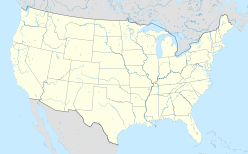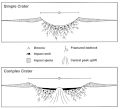Red Wing crater
| Red Wing crater | |
|---|---|
| Red Wing Creek structure | |
| Impact crater/structure | |
| Confidence | Confirmed |
| Diameter | 9 km (5.6 mi) |
| Age | 200 ± 25 Ma Late Triassic or Early Jurassic |
| Exposed | No |
| Drilled | Yes |
| Location | |
| Location | Watford City |
| Coordinates | 47°36′N 103°33′W / 47.600°N 103.550°W |
| Country | |
| State | North Dakota |
| Province | McKenzie County |
Red Wing or Red Wing Creek structure is a meteor crater located in McKenzie County, North Dakota, about 24 km (15 mi) southwest of Watford City, North Dakota, United States.[1]
The crater is not exposed to the surface, but was discovered using seismic techniques, and the structure has produced oil since its discovery in 1972. Red Wing is 9 km (5.6 mi) in diameter, and it is buried at a depth of about 2,000 m (6,600 ft)[2]: 335 The age of the structure is estimated at 200 ± 25 million years (Triassic).[1]
History
[edit]The Red Wing Creek structure shows up well in seismic studies. The underlying Ordovician rocks are overlain by disturbed Devonian and Mississippian rocks. The structural disturbance is filled by thick rocks of Jurassic age, suggesting that the impact took place during the Triassic.[2]: 336
Shell Oil Company drilled exploratory wells on the Red Wing Creek structure in 1965 and 1968. These wells did not find oil, but did indicate very thick sections of Mississippian and Pennsylvanian rocks. In 1972, True Oil Company drilled a well that discovered oil. This discovery had an oil column that was about 870 m (2,850 ft) thick instead of the normal 30 m (98 ft). This thick oil column was because the rocks were tilted on their sides.[2]: 336
The discovery of oil led to intense geological and geophysical studies of the Red Wing Creek area. In 1996, Christian Koeberl and his colleagues discovered planar deformation features (PDFs) in samples from two oil wells at the center of the structure.[2]: 335 This provided unambiguous evidence for shock metamorphism, and confirmed the impact origin of the Red Wing Creek structure.
Hypothetical multiple impact event
[edit]It has been suggested by Geophysicist David Rowley of the University of Chicago, working with John Spray of the University of New Brunswick and Simon Kelley of the Open University, that the Red Wing crater may have been part of a hypothetical multiple impact event which also formed the Manicouagan impact structure in northern Quebec, Rochechouart impact structure in France, Saint Martin crater in Manitoba, and Obolon' crater in Ukraine.[3] All of the craters had previously been known and studied, but their paleoalignment had never before been demonstrated. Rowley has said that the chance that these craters could be aligned like this due to chance are nearly zero.[4]
References
[edit]- ^ a b "Red Wing". Earth Impact Database. Planetary and Space Science Centre University of New Brunswick Fredericton. Retrieved 2009-08-19.
- ^ a b c d Christian Koeberl; Wolf Uwe Reimold & Dion Brandt (1996). "Red Wing Creek structure, North Dakota: Petrographical and geochemical studies, and confirmation of impact origin". Meteoritics and Planetary Science. 31 (3): 335–342. Bibcode:1996M&PS...31..335K. doi:10.1111/j.1945-5100.1996.tb02070.x.
- ^ Spray, J.G., Kelley, S.P. and Rowley, D.B. (1998). "Evidence for a late Triassic multiple impact event on Earth". Nature, v. 392, pp. 171-173. Abstract
- ^ Steele, Diana (19 March 1998). "Crater chain points to impact of fragmented comet". University of Chicago Chronicle.




